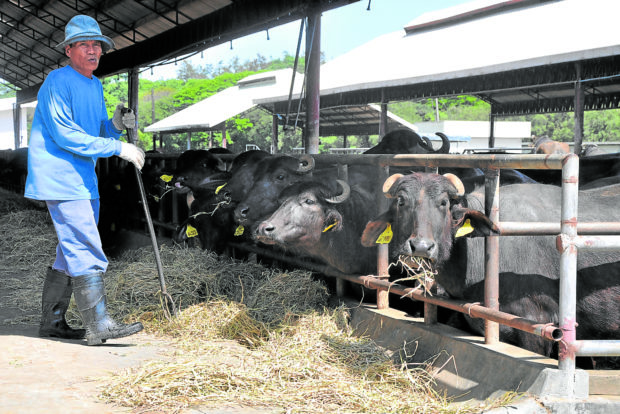
CARABAO CENTER In this file photo, a worker at the Philippine Carabao Center in the Science City of Muñoz in Nueva Ecija makes sure that carabaos kept in the research facility are fed regularly. Local dairy farmers, through their cooperatives, are getting help from food companies as their milk sales started to drop due to quarantine restrictions during the coronavirus pandemic. —WILLIE LOMIBAO
SCIENCE CITY OF MUÑOZ, Nueva Ecija, Philippines — With over 1.8 million liters produced last year, Nueva Ecija province remains the country’s leading source of carabao’s milk.
But local dairy farmers have increasingly faced a tightening market due to the government-imposed community quarantine against the new coronavirus disease.
While milk production continues despite the health crisis, dairy farmers have lost 50 percent of their income since April, according to Arnel del Barrio, executive director of the Philippine Carabao Center (PCC) here.
Disruption
A PCC survey said the drop in milk sales was mainly due to the limited access to the markets since a large part of the country was placed on lockdown, restricting movements of people and goods.“This pandemic has really disrupted the daily source of income of dairy value chain players,” Del Barrio said in a statement.
He said this gap in the market was recently filled when San Miguel Corp. (SMC), the country’s biggest conglomerate, started buying milk from the dairy farmers’ cooperatives this month.
These cooperatives include the Nueva Ecija Federation of Dairy Carabao Coop., Catalanacan Multipurpose Coop. Inc., Eastern Primary Multipurpose Coop., and the Pulong Buli Multipurpose Coop.
In a statement, Ramon Ang, SMC president and chief operating officer, said the firm allotted P500,000 through the San Miguel Foundation Inc. to buy 25,000 sachets of toned carabao’s milk, a processed milk product. Each sachet of 200 milliliters costs P20.
Excess milk
“By buying their excess milk, we are hoping to help not only our farmers stay in business but also get their produce to food banks and communities, addressing the growing food insecurity facing the poorest families,” Ang said.
He said the company had distributed toned carabao’s milk to 25,000 beneficiaries, mostly children and medical front-liners, through their feeding program in Metro Manila.
—Armand Galang